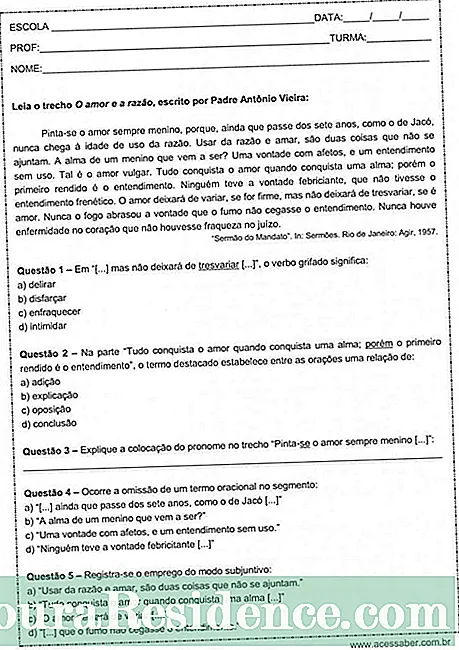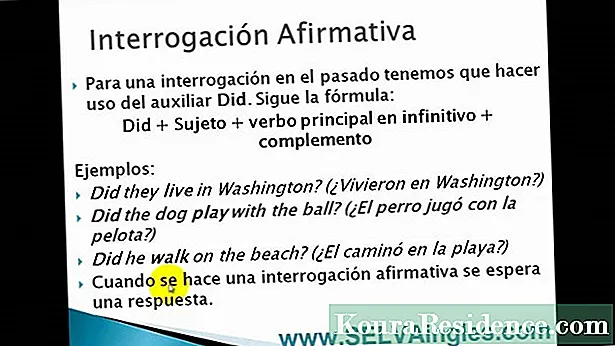
Content
- Examples of news journalistic genres
- Examples of journalistic opinion genres
- Examples of interpretive journalistic genres
The journalistic genress are forms of expression or species that have traits in common. All journalistic texts are used to narrate current events and are disseminated in the mass media. Each genre presents its characteristics, elements and particular forms, according to the journalist's intention.
According to the objective of the issuer and the degree of objectivity that it imprints on the message, three main types of journalistic genres are identified:
- Informative. They use a direct and objective language to describe an event in reality. The author is limited to transmitting data and concrete facts, and is not involved in what he is telling: he never uses the first person, value judgments or personal opinions. For example: the news, the objective report and the objective interview.
- Opinion. They express the point of view of the writer on a particular topic that the media should have previously reported on. Some include interpretations of the facts, others make value judgments about the motives and consequences that may arise from certain events, and some even propose solutions to improve the situation analyzed. For example: editorial, opinion piece, letters to the editor, column, criticism, and comic strips or illustrations.
- Interpretive. In addition to reporting an event, the author includes his opinion on it to link the event with the time and place in which it occurred. In these texts the journalist contextualizes a relevant event to give it meaning and, to do so, provides details, relates data, shuffles hypotheses and even makes projections about the consequences that the event can generate. For example: interpretive report, interpretive interview and interpretive chronicle.
Examples of news journalistic genres
News. It tells a current event that has public interest. The journalist organizes the data from highest to lowest importance, including enough data for the receiver to understand the fact. All news must answer the questions: what, who, when, where, why. For example:
- A Thai soldier killed at least 20 people in a shopping mall
- Jonathan Urretaviscaya will have six months of recovery
Interview. It is a conversation in which the journalist chooses his interviewee for the knowledge and information he can provide on a specific topic. In interviews, the objective is to obtain accurate data and, in general, the interviewees are not public figures but specialists in a subject. For example:
- Dengue: the virus of the poor
- "Drug addiction is not prevented by speaking ill of drugs"
Examples of journalistic opinion genres
Interview. It expresses the position of the media regarding a certain topic that is on the agenda. Reflecting the position of the company, these articles are never signed. For example:
- Bolsonaro vs. Lula
- Auschwitz, 75 years later
Review. Interpret events or cultural works. It fulfills three functions: informs, educates and guides the public. For example:
- "Succession": a fascinating series about egos, power and millionaire frivolity
- Martín Caparrós is measured with Echeverría, national and tragic poet
- "Judy": sing to death
Illustration. Through vignettes, the author prints his position in relation to a current issue. Illustrations may or may not be accompanied by text.
Column. It reflects the point of view of a journalist or specialist regarding a news item or topic that is on the agenda. This position does not always coincide with the editorial line of the medium. For example:
- A challenge for Chile and the world
- The democratic candidates clashed but kept Trump front and center
- See also: Opinion articles
Examples of interpretive journalistic genres
Interpretive Chronicle. It is a chronological account of an event that the journalist witnessed or managed to reconstruct through numerous sources. The story can be interrupted to incorporate analysis, opinion, reflections or data that enrich the story. For example:
- Better than Lassie
- The night Luis Miguel did not speak to his fans
Interpretive report. It narrates an event from its origins, alluding to its present state and anticipating the possible consequences it may have. Also, if the central fact constitutes a problem, the author points out possible solutions. The journalist must provide antecedents, comparisons, derivations and consequences regarding the central events of the report, in addition to the opinion or analysis of specialists on the subject, to enrich the content. For example:
- Why 2020 is a crucial year for climate action
- Why Latin America is the most violent region in the world (and what lessons it can take from European history)
Reader Letters. They are texts written by readers of the medium to give their opinion on different current issues. These letters are published in a specific section of the medium and usually add, correct, criticize or highlight some text previously published in that medium. For example:
- "My tenant went more than a year without paying my rent and I couldn't do anything"
- From Readers: Letters & Emails
Interpretive interview. The interviewer prepares questions that allow the public to know the analysis or reading that the interviewee has regarding a particular topic on the agenda. Among the interpretive interviews is the personality interview, which seeks to reflect the characteristics of a relevant figure and his position on one or more topics. In this case, the interviews can be with a politician, an artist, a sportsman, a scientist. For example:
- Joaquin Phoenix: "Making 'Joker' was not an easy decision at first"
- Rafa Nadal: "I am a lucky man, not a martyr"
- See also: Journalistic texts


